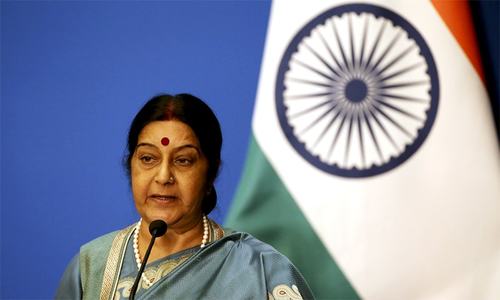India knows why Pakistan sentenced Jadhav to death, says envoy Basit
Pakistan's High Commissioner to India Abdul Basit defended the death sentence given to Indian spy Kulbhushan Jadhav by a Field General Court Martial, saying he received a fair trial, the details of which could not be made public, but the Indian government was aware of "what [Pakistan] is talking about".
In an interview with India Today on Wednesday, Basit said Jadhav was "not an ordinary man. He was a serving [Indian navy] officer," which is why he was tried in a military court "as so many other Pakistanis have been tried before [him]".
Jadhav was arrested on March 3, 2016, in a counter-intelligence operation in Balochistan's Mashkel area for his involvement in espionage and sabotage activities against Pakistan.
The charges he faced included spying for India, working against Pakistan’s integrity, sponsoring terrorism in the country and attempting to destabilise the state.
Also read: India will go out of its way to save Jadhav from death row: Swaraj
Defending Jadhav's sentencing, the envoy to India said that Pakistan has "arrested hundreds of operatives and foot soldiers on the basis of information provided by Jadhav" ever since his arrest.
When asked why was India not allowed consular access to Jadhav despite regulations under international law, Basit said that consular access is not "automatic", especially for matters that are "sensitive and related to security".
"Consular access is not provided across the board, let us remember that," he maintained.
"We must understand Commander Jadhav had been visiting Pakistan since 2003 on an original, genuine Indian passport under the fake name of Mubarak Hussain Patel. It is for you to tell us why he was travelling under a fake name with an original Indian passport," the envoy said.
While drawing a parallel between Jadhav's trial and the trial of Ajmal Kassab — whom India indicted and hanged over the 2008 Mumbai attacks, Basit said: "My advice to you would be that please do not mix apples with oranges lest you draw convoluted conclusions."
He said Pakistan cannot be blamed "if the trial in the Mumbai attacks had not been fast [enough]".
Basit further said that Pakistan first submitted a dossier on Jadhav to the United Nations Secretary-General in September 2016. "That was our initial dossier and we have been able to gather more evidence [since then]," he added.
"Now that [Jadhav] has been convicted, he would have the right to appeal. If his verdict is upheld by the appellate court, then he would ultimately have the right to a [mercy] petition," the envoy confirmed, adding that Jadhav was provided a defence counsel and that his trial was conducted according to the relevant laws, the Pakistan Army Act of 1952, in the country.











































